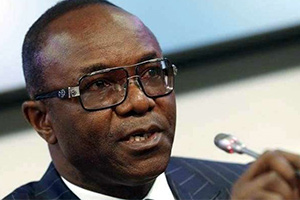
The Minister was speaking in Abuja at the ongoing Nigerian Oil and Gas, NOG Conference on the theme: “Reforming and Repositioning the Oil and Gas Industry in Nigeria.’’
Mr. Kachikwu explained that the new investments would aim at addressing some of the challenges the industry was currently facing, covering pipelines development, refineries rehabilitation, gas and power infrastructure, facility refurbishment and upstream financing.
The objective of the investments, the minister said, would be to bridge the infrastructure funding gaps in the industry.
He said the time to bring down the cost of crude oil production and have the right incentives for industry growth was now.
He said three years ago, the country had several issues that bordered on cost and technology, rather than where to get the money, because of bad crude price regime.
“Between 2015 and 2016, we took drastic measures to moderate crude oil prices,” the minister said. “But, between July 2016 and now, there have been lots of stability in the downstream economy. There are still some challenges, but work is in progress,’’ he said.
The minister identified the major problem the upstream sector of the industry was now facing to be how to resolve the $6 billion Joint Venture, JV funding debt and other litigations.
He said an outstanding debt of $5.1 billion would be paid over five years through incremental oil production volumes, pointing out that government believes the new cash call model it recently approved would help free its resources and help production stability.
“There are still some governance issues to be addressed. But once this is resolved, our expectation is that there would be improvement in oil production.
“We are left with options of bringing in investors that will help address the over $45billion infrastructure deficit.
“Government wants to be bold enough to take steps that have not been taken before. We have to release our assets to private investors.
“Either gas pipeline, crude pipeline, the time has come to move from government ownership to private ownership for efficiency,’’ the minister said.
To boost the country’s oil and gas production, Mr. Kachikwu said government had commenced serious engagement with all interest groups in the Niger Delta to achieve stability in the region.
Government’s immediate plan, he said, was to grow the country’s oil production from the current 2.2 million barrels to three million barrels per day.
He said the high cost of production in the industry was as a result of the crisis in the Niger Delta region, with the militancy issue as key.
“We have set a target of zero militancy for 2017. It is achievable due to lots of community-based activities and motivation,’’ the minister said, adding that the ongoing consultation by the acting President, Yemi Osinbajo to the region would continue.
He emphasized the need for the oil sector not to wait for a political solutions to the issues, but for the oil companies to collaborate with state governments on how to capture some benefits together.
Visiting Secretary-General of the Organisation of Petroleum Exporting Countries, OPEC, Mohammed Barkindo, in his remarks commended Nigeria for finding solutions to the perennial funding challenge by exiting the Joint Venture Cash Call debt.
“I must commended Kachikwu for securing the feat on behalf of the government. The frontal approach on the lingering issue of funding our exploration as well as production the JVC is highly commendable.
“The approach has been innovative, the solution very practical. Many of my colleagues, here that we served together, will testify that government after government, regime after regime, had battled with this issue continuously without solution.
“This is a confession: the day you overcome this issue that had beleaguered this industry as well as government, you (Kachikwu) made my day,” Mr. Barkindo said.
